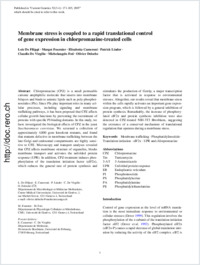Membrane stress is coupled to a rapid translational control of gene expression in chlorpromazine-treated cells
- Filippi, Loic De Département de Microbiologie et Médecine Moléculaire, Centre Médical Universitaire, Université de Genève, Switzerland
- Fournier, Margot Département de Physiologie Cellulaire et Métabolisme, CMU, Université de Genève, Switzerland
- Cameroni, Elisabetta Département de Microbiologie et Médecine Moléculaire, Centre Médical Universitaire, Université de Genève, Switzerland - Département de Médecine, Division de Biochimie, Université de Fribourg, Switzerland
- Linder, Patrick Département de Microbiologie et Médecine Moléculaire, Centre Médical Universitaire, Université de Genève, Switzerland
- De Virgilio, Claudio Département de Microbiologie et Médecine Moléculaire, Centre Médical Universitaire, Université de Genève, Switzerland - Département de Médecine, Division de Biochimie, Université de Fribourg, Switzerland
- Foti, Michelangelo Département de Physiologie Cellulaire et Métabolisme, CMU, Université de Genève, Switzerland -
- Deloche, Olivier Département de Microbiologie et Médecine Moléculaire, Centre Médical Universitaire, Université de Genève, Switzerland
-
21.08.2007
Published in:
- Current Genetics. - 2007, vol. 52, no. 3-4, p. 171-185
English
Chlorpromazine (CPZ) is a small permeable cationic amphiphilic molecule that inserts into membrane bilayers and binds to anionic lipids such as poly-phosphoinositides (PIs). Since PIs play important roles in many cellular processes, including signaling and membrane trafficking pathways, it has been proposed that CPZ affects cellular growth functions by preventing the recruitment of proteins with specific PI-binding domains. In this study, we have investigated the biological effects of CPZ in the yeast Saccharomyces cerevisiae. We screened a collection of approximately 4,800 gene knockout mutants, and found that mutants defective in membrane trafficking between the late-Golgi and endosomal compartments are highly sensitive to CPZ. Microscopy and transport analyses revealed that CPZ affects membrane structure of organelles, blocks membrane transport and activates the unfolded protein response (UPR). In addition, CPZ-treatment induces phosphorylation of the translation initiation factor (eIF2α), which reduces the general rate of protein synthesis and stimulates the production of Gcn4p, a major transcription factor that is activated in response to environmental stresses. Altogether, our results reveal that membrane stress within the cells rapidly activates an important gene expression program, which is followed by a general inhibition of protein synthesis. Remarkably, the increase of phosphorylated eIF2α and protein synthesis inhibition were also detected in CPZ-treated NIH-3T3 fibroblasts, suggesting the existence of a conserved mechanism of translational regulation that operates during a membrane stress.
- Faculty
- Faculté des sciences et de médecine
- Department
- Département de Biologie
- Language
-
- English
- Classification
- Biological sciences
- License
-
License undefined
- Identifiers
-
- RERO DOC 8473
- DOI 10.1007/s00294-007-0151-0
- Persistent URL
- https://folia.unifr.ch/unifr/documents/300588
Statistics
Document views: 152
File downloads:
- pdf: 187
